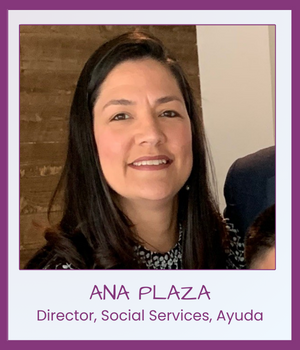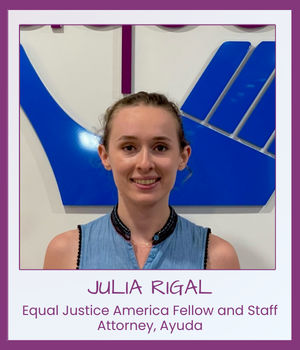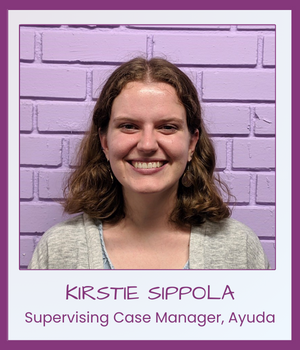Just over a year ago, the governors of Texas and Arizona began sending buses of migrants to our DC community, and other sanctuary cities. Since April 2022, Ayuda’s team has been part of the coordinated effort to welcome these individuals with dignity. We recently spoke with Ayuda’s legal and social services staff to find out how things have – or haven’t – changed for our newly arriving neighbors over the last year.
When buses first began arriving at Union Station, the media was quick to jump on the story. For some, it was a tale of political theater gone wild. But what has always mattered most is that the thousands of migrants arriving on these buses are human beings who deserve our care, support, and respect. The media may have moved on from covering DC’s humanitarian efforts…But make no mistake – The need for resources and support of newly arrived migrants is just as strong today as it was in April 2022.
HOW AYUDA IS HELPING
As of this writing, Ayuda is seeing anywhere from 50 to 100 migrants arrive at our doors each week. They come tired. They come hungry. They need housing. They need medical care. They need hope.
“They want to know that they are not alone,” says Ana Plaza, Ayuda’s Social Services Director
Since last year, we’ve done everything in our power to show recently bused migrants just that. Working alongside nonprofit partners and with the support of generous funders, Ayuda has continued to provide a helping hand in the form of:

LEGAL ORIENTATIONS
Helping migrants understand where they are in the immigration process and identify the next step in their journeys.
PRO BONO COORDINATION
Placing migrant cases with volunteer attorneys at Ayuda’s firm partners + helping seek parole-based work permits.
ESSENTIAL NEEDS
Providing migrants with food, hygiene kits, direct financial support, housing assistance, and transportation.
HEALTH & SAFETY
Coordinating migrants’ medical care + providing trauma-informed, culturally specific therapy + mental health services.
Demand for Ayuda’s help is high, but we are doing our best to assist as many people as possible. For recently arrived migrants seeking assistance in DC:
FOR LEGAL HELP
Start with one of Ayuda’s free immigration legal clinics, held roughly every month by phone. Click here and find upcoming clinics at the bottom of the page.
FOR SOCIAL SERVICES
Walk-in info sessions with a wealth of resources for recently bused migrants are held roughly once per month. Click here for schedule (as of May 2023) and more details.
THE DIFFERENCE OF A YEAR: PIVOTING TO LONGTERM
Ayuda Supervising Case Manager Kirstie Sippola notes that a year ago, every time a bus came, Ayuda and partners would find themselves in a whirlwind – trying to quickly coordinate nonprofit responders at the intake point. Many of the migrants were only passing through DC, so the primary goal was to provide them with necessities for just a few days before they continued travelling.
Since the creation of the DC Mayor’s Office of Migrant Services (OMS) in September 2022, the response at Union Station and other intake points has become more coordinated. But now, we’re seeing more individuals who wish to make DC their permanent home. Word has gotten out about our community’s services; many migrants have traveled here separate of any busing efforts. Ayuda’s case managers and attorneys concur: The need for long-term support is urgent.
“People are living in motels,” Sippola notes. “There are [Ayuda] clients that have been living there almost a year now…and they have no way of leaving.”
Direct financial assistance goes a long way, too. Many of these migrants qualify for work permits but can’t secure their ticket to legal employment because of the $500 application fee. This particularly concerns Sippola, who has encountered several recently bused individuals being exploited for labor.
Demand for legal services has also shifted toward the long-haul. Since April 2022, Ayuda Staff Attorney/Equal Justice America Fellow Julia Rigal has been spearheading our legal orientations for newly arrived migrants. She’s noticed that the busing has slowed, but need for legal support has only grown. Ayuda and other nonprofits offer legal consultations that help people understand the basics of their immigration case, but there’s an urgent demand for pro bono attorneys to directly take on individual cases.

“Many of the families who remained in the DC area arrived over the summer,” explains Rigal, “There is now a GREAT need for assistance with filing asylum applications, which must be filed within one year of entering the U.S.”
NEED IS GREAT. TOGETHER, WE CAN MEET IT.
A common observation came up throughout all our conversations with Ayuda staff: The most noticeable change between a year ago and today is less media attention on recently bused migrants in DC.
According to Sippola, this reality is both good and bad. Migrants stepping off a bus at Union Station no longer contend with cameras and microphones being pushed in their face, when what they really need is a helping hand.
But less media attention means less funding for our work supporting newly arrived migrants. We were heartened by the outpouring of financial contributions from supporters big and small last summer. We know our incredible community responds when our immigrant neighbors need a helping hand. The need is still very much here; please remember that your support is still urgent.
“We need all hands on deck in this situation,” as Sippola puts it.

Just like in April 2022, we don’t know if or when the buses will stop bringing migrants to DC. Ayuda’s local government partners have advised us to prepare for a possible influx of migrants with the end of Title 42, so if anything, we anticipate the demand for our work will grow.
The only thing we know for sure is that Ayuda will be here doing what we do best: Giving a helping hand to as many newly arrived migrants and low-income immigrants as we can.
Ayuda’s Board of Directors will match up to $16,000 in donations made through May 31. Give now to DOUBLE your impact.
Email [email protected] if you would like to speak to one of Ayuda’s case managers or attorneys about our work supporting newly arrived migrants in D.C.

